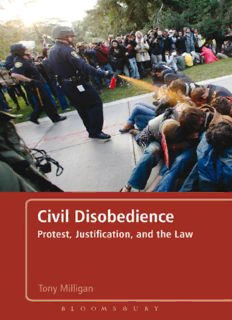
Civil disobedience : protest, justification and the law PDF
Preview Civil disobedience : protest, justification and the law
Civil Disobedience Civil Disobedience Protest, Justification, and the Law TONY MILLIGAN NEW YORK • LONDON • NEW DELHI • SYDNEY Bloomsbury Academic An imprint of Bloomsbury Publishing Plc 175 Fifth Avenue 50 Bedford Square New York London NY 10010 WC1B 3DP USA UK www.bloomsbury.com First published 2013 © Tony Milligan, 2013 All rights reserved. No part of this publication may be reproduced or transmitted in any form or by any means, electronic or mechanical, including photocopying, recording, or any information storage or retrieval system, without prior permission in writing from the publishers. No responsibility for loss caused to any individual or organization acting on or refraining from action as a result of the material in this publication can be accepted by Bloomsbury Academic or the author. ISBN: HB: 978-1-4411-8229-6 Library of Congress Cataloging-in-Publication Data Milligan, Tony. Civil disobedience : protest, justification and the law / by Tony Milligan. pages cm Includes bibliographical references and index. ISBN 978-1-4411-1944-5 (hardcover : alk. paper) -- ISBN 978-1-4411-3209-3 (pbk. : alk. paper) 1. Civil disobedience--United States. 2. Civil rights--United States. I. Title. JC328.3.M55 2013 303.6'10973--dc23 2012036379 Typeset by Fakenham Prepress Solutions, Fakenham, Norfolk NR21 8NN To Suzanne, for showing me a gentler strength. CONTENTS 1 The Occupy Movement 1 2 A problematic concept 13 3 The argument from below 25 4 Reactionary disobedience over abortion 35 5 Disobedience in defense of cruelty 47 6 Thoreau, conscience, and the state 59 7 Tolstoy’s politicization of love 71 8 Gandhi and satyagraha 83 9 King, pragmatism, and principle 93 10 Defending the environment 103 11 Open rescue and animal liberation 117 12 Covert animal rescue 127 13 The higher law 137 14 The question of violence 149 Bibliography 159 Notes 163 Index 177 CHAPTER ONE The Occupy Movement Civil disobedience has become an endangered concept. Or at least that was the case until a wave of mass non-violent dissent hit North Africa, parts of South-West Asia, Western Europe and North America during 2011, raising all sorts of issues about how to understand contemporary political unrest as well as bringing the legitimacy of economic and political institu- tions into question. Even at the time, an obvious case could be made for regarding a large number of the protests as civil disobedience, but some commentators were cautious about doing so. They raised concerns about the relevance of the very idea of “civil disobedience” to something so new and so radical. In the course of this book I will attempt to allay these fears and to show that claims of civil disobedience have a vital, forward-looking role to play. Moreover, they can defensibly be made about a wide range of actions including many of those carried out by participants in the Occupy Movement in America and Western Europe. This opening chapter will be given over to a narrative account of the latter. My undisguised deter- mination to vindicate the relevance of civil disobedience may, however, raise some concerns about the narrative, about the possibility that it could be skewed to support my overall conclusion. Like all such narratives of dissent, it may be challenged in point of detail and interpretation. There is, after all, a gap that invariably opens up between protest on the ground and subsequent reportage. Nonetheless, what follows is an outline of events that should be recognizable to participants and recognizable also to the vastly larger number of sympathetic onlookers whose connection to events was primarily through the popular media. In places, it may also capture a sense of the excitement of the moment.
Description: